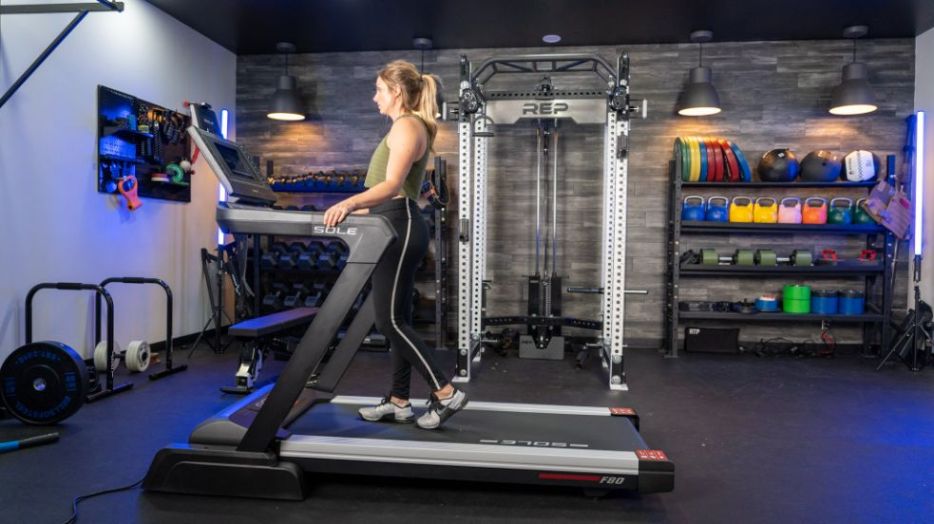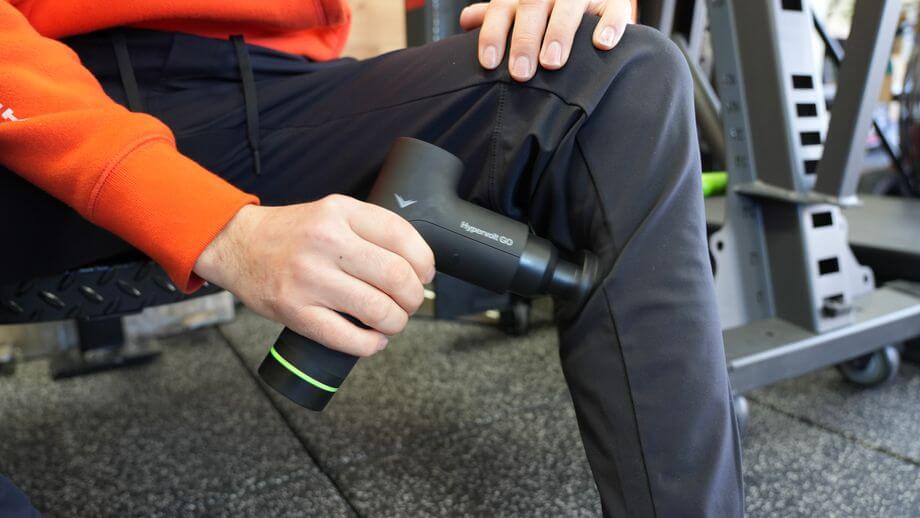Whether we’re talking about careers, relationships, fitness, or anything else, change can be hard. The hardest part of all is taking that first step.
Luckily, when it comes to your beginner cardio workout, it is a literal first step. We don’t even need to be confused with metaphors!
Follow the advice below for tips for additional steps, strides, and hurdles. No metaphors, just action.
RELATED: What Is Cardio?
Before You Start: Tips for a Good Cardio Workout
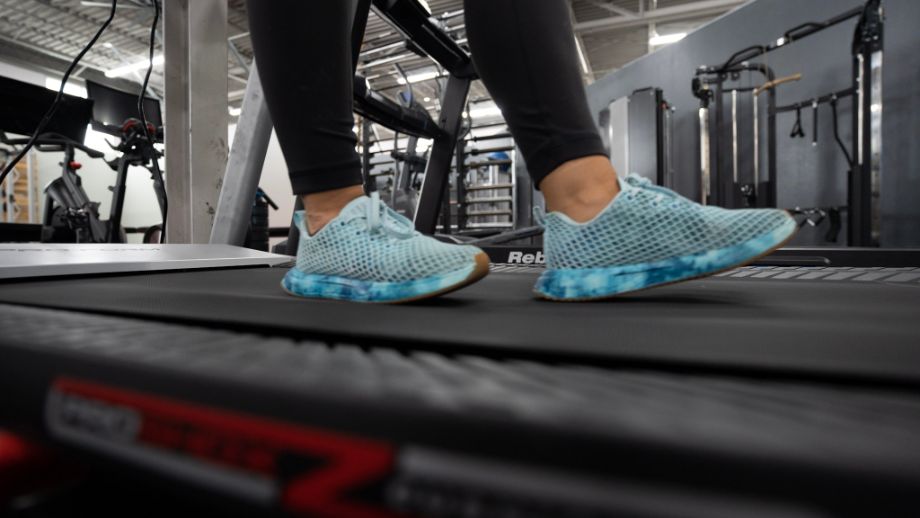
Let’s get off on the right foot! Going into any new workout plan, there are a few things to keep in mind.
1. Understand Your Fitness Level
This story has played out for decades: There’s a certified personal trainer with a fresh CPT cert from the NSCA. They set up a sweet exercise program to help them lose weight.
The workout includes a warmup of 10 burpees, 20 jumping jacks, 10 mountain climbers, and two laps of walking lunges before you jump into the good stuff. You get through 3 burpees and stop because you’re gassed. Only 59 more minutes to fill in the session!
Pop culture can make it seem like brutal bootcamp workouts are de rigueur for weight loss and general fitness. Don’t buy into it. Understand where you are and do what you need to improve. If you are new to fitness, then two laps of walking lunges isn’t going to be a good fit for your first workout. Understand that you’ll need to ease into it.
2. Focus on Health First
It’s important to remember why you’re doing what you’re doing. The benefits of cardio are endless, but for many people, the reason to get started is to get healthy.
The American Heart Association’s canonical advice to get in 150 minutes of moderate intensity physical activity per week is oft-quoted. Additionally, the CDC lists heart disease1 as the No. 1 cause of death among adults in America.Diabetes also makes the top 10.
While Type 1 diabetes is purely genetic and establishes itself in childhood, Type 2 diabetes is more commonly acquired in adulthood. According to The Mayo Clinic2, a high bodyweight and a sedentary lifestyle are both contributors to Type 2 Diabetes. Several studies also seem to indicate that even moderate amounts of cardiovascular exercise3 may be effective at both preventing and treating the illness4.
None of the literature suggests you need to have an elite “Murph” time to reap these health benefits. Get yourself and your body in a healthy place before taking on other types of challenges.
3. Set Expectations So Low You Can’t Fail
Setting your alarm clock for 4 a.m. and planning on doing a 5-mile run every day may seem like a great idea, but it is a daunting mental task for beginners. Too many people set these kinds of expectations for themselves; most of us aren’t David Goggins.
(Think what a terrifying world it would be if we were.)
If you are brand new to the world of cardio workouts, start at a point you absolutely cannot fail at and build your routine from there. If you have a desk job, make it a goal to stand up, pick your right leg up, then pick your left leg up, and walk in place for 30 seconds every hour. It’s too easy not to do!
Setting small, attainable goals can keep you motivated and give you a sense of accomplishment.
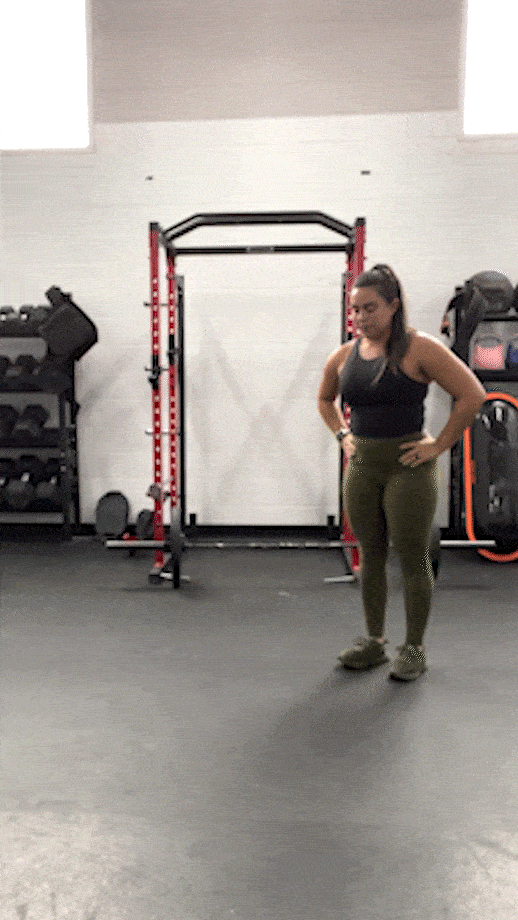
4. Go Easy on Yourself
This goes for the types of cardio exercises you choose, as well as your mental and physical health. It’s way more hardcore to take a day off, chill out, and come back the next day than to run yourself into the ground and never exercise again.
You don’t need to do a brutal two-a-day regimen of high-intensity full body workouts, and you don’t need to beat yourself up if you need to cut your walk short because you got too tired to continue.
5. Eat
When people go on weight loss binges, the first thing they do after buying some spandex (excuse me, Under Armour) and Googling “aerobic exercise routine” is to stop eating.
Your body is dealing with a totally new stimulus. Now is a terrible time to deprive it of nutrition. Making one small change at a time allows the body to receive the input and focus on adapting to this one new thing. Long-term improvement involves slowly stacking these up like in Jenga.
Think how hard it would be to remove two or three pieces at a time in Jenga. That’s how your body feels when you want to start doing a cardio routine while also starting to diet.
And remember to drink water. Dehydration can lead to both lowered performance and injury5. Don’t overcomplicate it.
6. Give It Time
Anything worth doing takes time. There is no magic finish line for cardiovascular health or general fitness. There is always another hill to climb, a bigger weight to move, a new photo-op to look rad in, and a better time to achieve. Constantly looking for results takes some of the fun away from the journey.
7. Understand RPE
Lasly, before we get into the workouts, we need to talk about RPE: the rate of perceived exertion. This is a fancy way of saying, “how you feel while exercising.” There are various RPE scales out there, but most run from 1 to 10, with 1 being very low intensity and 10 being your maximal effort.
As a beginner to cardio, I advise living in the 2 to 6 range at first. Start with lighter activities where you can still carry on conversations while you’re doing them. Gradually progress to higher levels of intensity, where you can still respond to someone in short sentences while you’re exercising, but you aren’t out of breath or unable to speak.
This progressive journey into intensity allows you to safely build your aerobic capacity and also gives you more confidence as you feel better moving through your workouts.
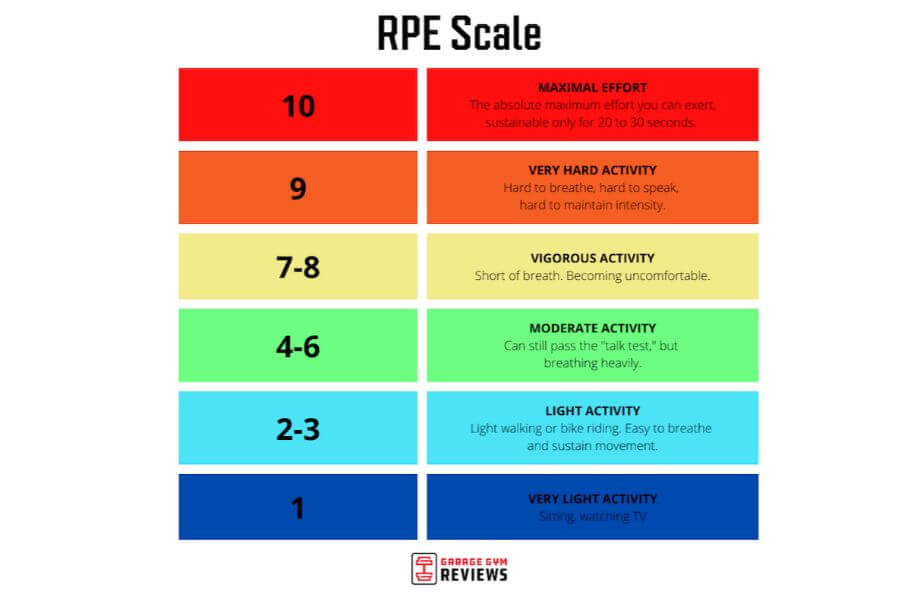
Walking Beginner Cardio Workout
This workout is for absolute beginners to fitness. Walking may be one of the most enjoyable and relaxing workouts a person can do. We’re going to use this workout to set habits and establish a functional cardio base. Keep the RPE here in the 2-3 range.
Workout
Day 1
- Walk for 10 minutes at an easy pace
Day 2
- Walk for 15 minutes at an easy pace
Day 3
- Walk for 10 minutes at brisk pace
And on and on. You get to accomplish more every workout! You’ll be amazed how quickly you go from walking 50 feet to walking multiple miles a day.
You can also structure this as walking to the telephone closest to your home on Day 1, walking to the next telephone pole on Day 2, and so on. You can do this as often as you want, even multiple times a day as you get more into it. You can replace “telephone pole” with anything convenient (eg. fire hydrant, house, cow field, etc.).
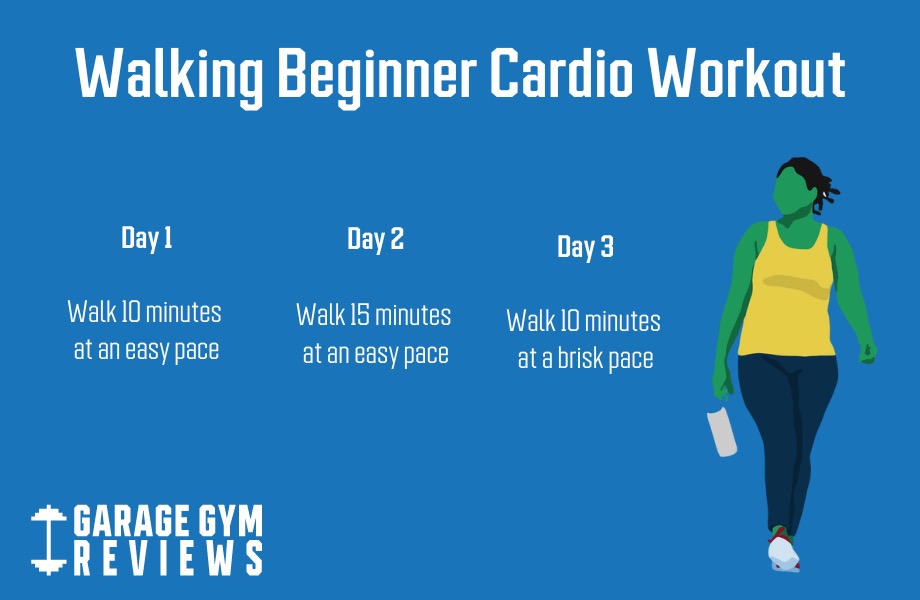
At-Home Beginner Cardio Workout
Even if you are a member of a gym, home workouts are a great way to sneak in extra cardio sessions (you know, the ones you like to find excuses to skip). Having no equipment on hand can force more advanced exercisers to be creative and do stuff they really don’t want to do (again with the excuses to skip).
This basic routine is a full-body, low impact workout. If your strength is a limiting factor, feel free to do push-ups from your knees. Ditto with the squats; if your glutes and hamstrings aren’t strong or flexible enough yet, go ahead and sit on a chair or box.
You will need some kind of timer for this. Having timed workouts keeps you honest and gives you a finish line to look forward to. You can modify this 10-minute cardio workout to extend to 20 or even 30 minutes as you improve.
We’re going to be doing regressions of some higher intensity exercises, with a focus on getting up and down off the ground. This is both extremely tiring and a good survival skill to have. Moderate your pace to not go above 7-8 RPE.
Workout
3 Rounds:
- 30 second push-ups. Stand up and return to the starting position after each rep.
- 30 seconds squats with a 1-count pause at the bottom
- 30 seconds rest
- 60 seconds straight leg sit-ups. Use body momentum to “swing” yourself forward. Stand up after each rep (see if you can use the momentum to help get up).
- 30 seconds rest
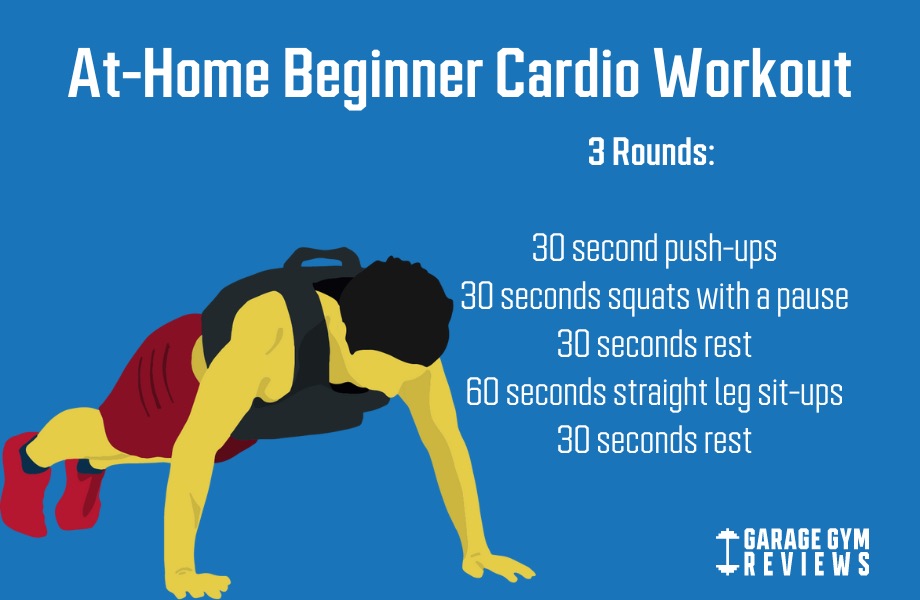
Beginner Machine-Based Cardio Workout
While the previous at-home workout is more of an HIIT workout, the great thing about cardio machines is the ability to maintain a continual pace to keep your heart rate in Zone 2, or RPE 4 to 6.
Unfortunately, some people do find low-intensity, steady-state cardio to be insanely boring. Play this game while on the elliptical/treadmill/stair stepper/recumbent bike.
20-Minute Workout
- Start at a slow pace for 5 minutes
- At 5 minutes, up the speed/resistance
- At 6 minutes, lower the speed/resistance
- At 7 minutes, up the speed/resistance
- At 8 minutes, up the speed/resistance
- At 9 minutes, lower the speed/resistance
- At 10 minutes, lower the speed/resistance
- At 11 minutes, up the speed/resistance
- At 12 minutes, up the speed/resistance
- At 13 minutes, up the speed/resistance
- At 14 minutes, lower the speed/resistance
- At 15 minutes, lower the speed/resistance
- At 16 minutes, lower the speed/resistance
- Finish the remaining 4 minutes at a moderate pace
The act of making changes and counting down the time to the next change will help keep you engaged.
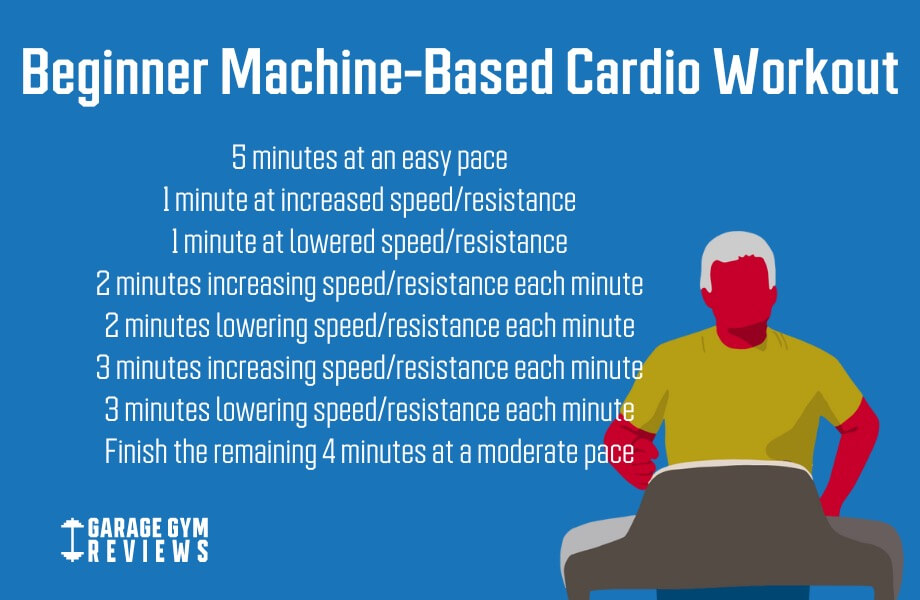
When to Add Strength Training
When you are severely deconditioned, every cardio workout you do is also a strength training workout. Don’t worry about it! How fun is it to get stronger for “free”?
Enjoy getting sore quads from walking uphill while you can. At some point you’re going to be a hill walking monster and will miss feeling your muscles bulging out.
Having a cardio base is essential for strength training. Even simple movements like bodyweight squats and pushups will jack your heart rate up quickly if you are even a bit deconditioned to them. If doing 10 squats gets you breathing hard, imagine how much higher your heart rate will be if a barbell weighing as much as you do is loaded onto your back!
If you are unclear about when to add in dedicated strength workouts, check with a certified personal trainer or other fitness professional.
Beginner Cardio Workout: Q&A
What is the best cardio for beginners?
Let’s pretend “beginner” means someone who has taken 6 months off from work to watch everything on Netflix, has had all their food delivered to them, and lives in a 600-square-foot studio (this minimizes the steps needed to use the bathroom).
“Cardio” can be as simple as creating new habits. Park as far away from the grocery store as possible. Force yourself to use a basket instead of a shopping cart so you have to make multiple trips (and you’d be doing farmer’s walks!).
The point here is that the “best cardio” is the kind that you will do. Setting up super-attainable expectations is a great way to train your mind to want to do the work. A 30-mile ruck probably isn’t on the agenda for the beginner, but a walk around the block sure could be.
How long should a beginner do cardio?
Let’s assume “beginner” here is someone who is comfortable walking around a County Fair. You want to hit your 150 minutes a week, per the American Heart Association, and after that it’s all based around intensity.
Your steady-state, low-impact cardio workouts like biking or walking can last as long as you’re having fun, while your high intensity workouts need to stay in that 10-20 minute range. You don’t want to beat yourself into the ground by thinking that “more is always better.” If you are dreading your workout it might be too long.
How much cardio should a beginner start with?
Is “enough” too kitschy of an answer? Your cardio workouts should be part of a logical, long-term program. This might seem scary, but it’s way less scary than not having a plan.
Having a performance goal is a rocking way to help yourself progress and give structure to your plan. Maybe you want to run a 5k in 6 months, or squat your bodyweight with a barbell. Maybe that Murph thing really looks fun to you (you sicko…). Once you establish a goal you can assess where you are currently at and develop a plan from there. I love it when a plan comes together!
Even if you are doing this cardio thing purely for health (or even aesthetic) reasons, a performance goal is a powerful motivator.
How do I start off with cardio?
You probably don’t need to start by dropping $5k on some fat burning equipment. Start by finding physical activities you enjoy. Mowing the lawn or taking care of an herb garden takes work! Don’t be afraid to try new things. Maybe you’ll find you love swimming or bicycling.
Ultimately, you start by just starting! Don’t be afraid of it. Cardio doesn’t have to be the boogeyman. You move a little bit, find you enjoy it, then you move a little more. Just start moving!
References
1. Murphy SL, Kochanek KD, Xu JQ, Arias E. Mortality in the United States, 2020. NCHS Data Brief, no 427. Hyattsville, MD: National Center for Health Statistics. 2021. DOI: https://dx.doi.org/10.15620/cdc:112079
2. The Mayo Clinic, Type 2 Diabetes
3. Knowler WC, Barrett-Connor E, Fowler SE, Hamman RF, Lachin JM, Walker EA, Nathan DM; Diabetes Prevention Program Research Group. Reduction in the incidence of type 2 diabetes with lifestyle intervention or metformin. N Engl J Med. 2002 Feb 7;346(6):393-403. doi: 10.1056/NEJMoa012512. PMID: 11832527; PMCID: PMC1370926.
4. Boulé NG, Robert C, Bell GJ, Johnson ST, Bell RC, Lewanczuk RZ, Gabr RQ, Brocks DR. Metformin and exercise in type 2 diabetes: examining treatment modality interactions. Diabetes Care. 2011 Jul;34(7):1469-74. doi: 10.2337/dc10-2207. Epub 2011 May 20. PMID: 21602430; PMCID: PMC3120188.
5. O’Neal EK, Wingo JE, Richardson MT, Leeper JD, Neggers YH, Bishop PA. Half-marathon and full-marathon runners’ hydration practices and perceptions. J Athl Train. 2011 Nov-Dec;46(6):581-91. doi: 10.4085/1062-6050-46.6.581. PMID: 22488182; PMCID: PMC3418934.


